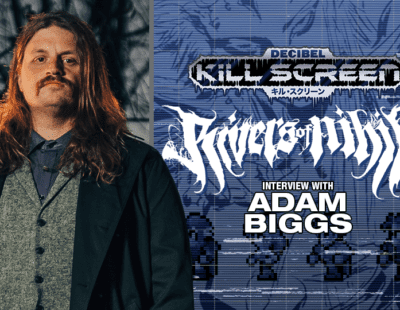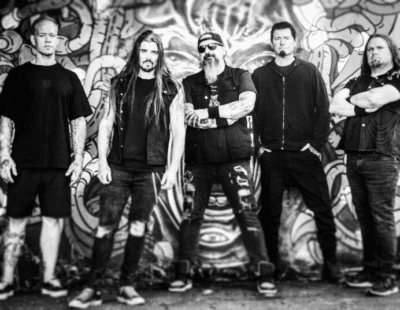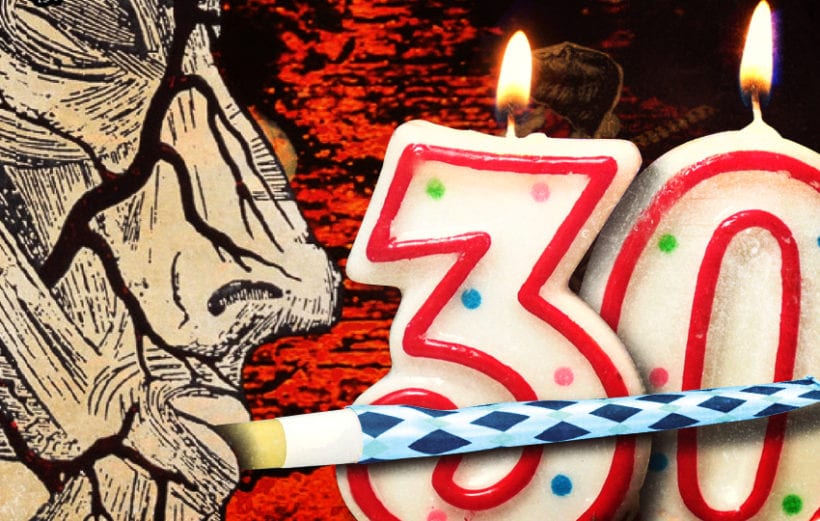
On July 1, 1990, Napalm Death did what they do often: They created a milestone in extreme music history. On that day, the band released their third full-length album, Harmony Corruption. The record marked a massive turning point for Napalm, as they added more death metal to their grind and more members to the fold—three of them, in fact: vocalist Mark “Barney” Greenway and guitarists Jesse Pintado and Mitch Harris.
To celebrate the anniversary of Harmony Corruption’s release, we caught up with Harris and longtime bassist Shane Embury to look back on three decades of corruption.
First off, quick, word association time: What comes to mind right away when I say “Harmony Corruption”?
Embury: Being young. Driving around in a rental car with Mitch and Jesse blasting N.W.A., Skinny Puppy and Public Enemy. Super Big Gulps. Barn recording all of his vocals in a day, stoned, in the studio. Sleeping on the couch at Morbid Angel’s house. Scott Burns, super nice guy. Being super chuffed to be in Florida, the land of death metal. Maybe should have paid more attention to the recording, but in hindsight, I don’t regret a minute.
Harris: Scott Burns is an amazing guy, experienced, talented, key player in the scene. He showed the true spirit of underground bands on a budget with full love, support, conviction in everything he did. The music world seemed to stagnate for a while; the underground was on the crest of a wave combining different elements of a new diverse edge, extreme with conviction. The album is far from perfect, but it showed a band with long-term vision, united, focused, driven, hungry, excited and ready to push the boundaries for the next phases of evolution.
The album is turning 30. Aside from “old,” how does that make you feel?
Embury: Hard to say. I miss Jesse, I miss Mitch. The whole recording was a learning curve. Mick [Harris, drums] had a hard time. Time moves so fast and it’s amazing we are still here. I like the fact the album sounds so different and is cause for discussion. Whatever anyone says, I am glad we did it at Morrisound.
Harris: Well, I was barely 19 years old, so it’s a pleasant reminder of adolescence, where everything felt possible and walls need to be broken down, much like now.
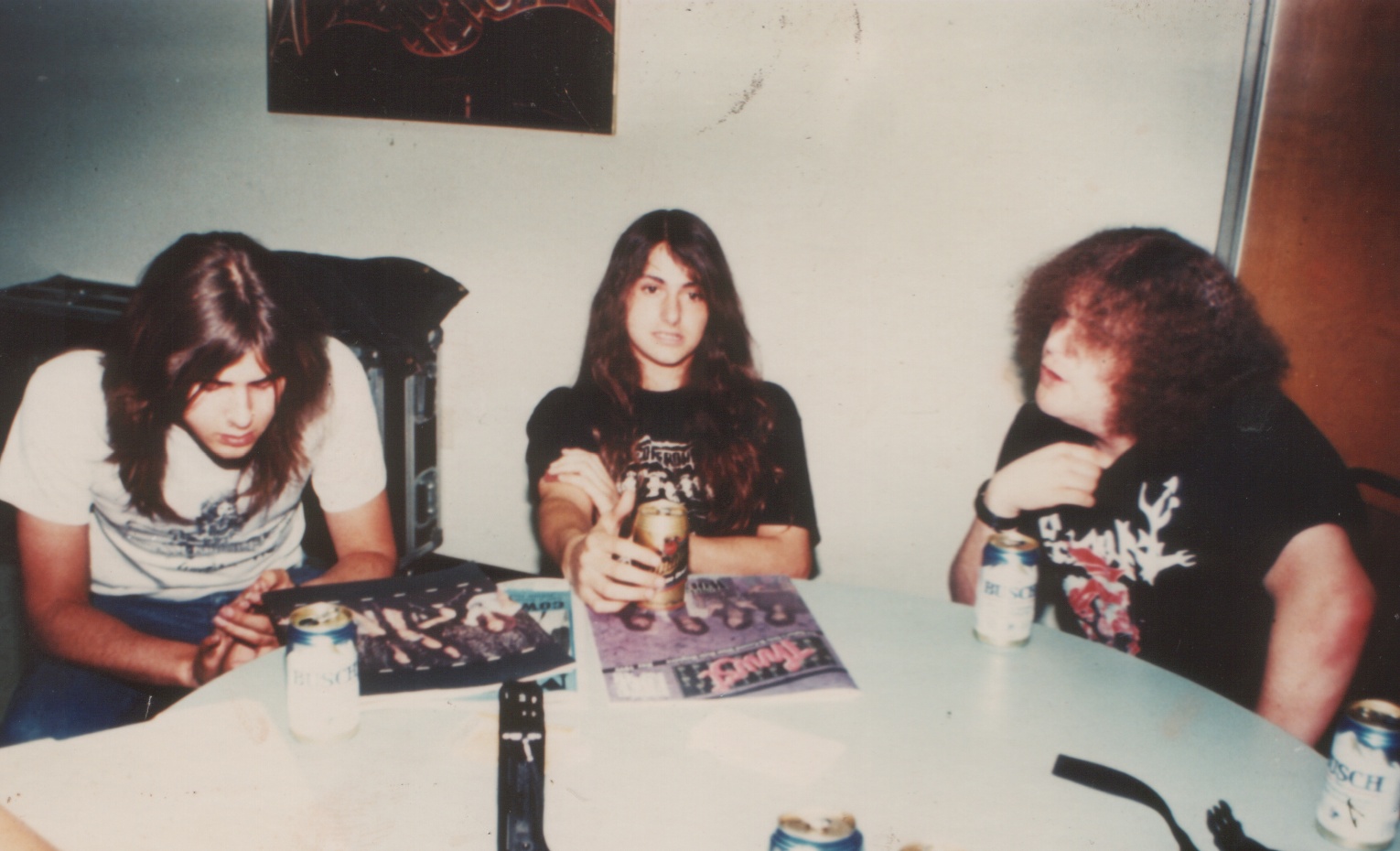
What do you think is the legacy of this album?
Embury: Well, it turned a lot of people on to the band who I guess had never given us the time of day, but also turned old-school fans off. Being young at the time and seeing the reactions was kind of scary; as you get older, opinions matter less, but it captured the time. Over in the states it has the same nostalgia as Scum. We will always have to play “Suffer the Children.”
Harris: For the first time, there was an actual band that lived and breathed one collective vision. That counts for a lot! For some, it was an introduction to our amalgamation of underground tape-trading heroes. To others, it was a vague comparison to the previous institution or “perception” of fans’ “perfect vision” of prior lineups, recordings and approaches.
It was an honor, an oath for me, to join and collaborate with my all-time favorite band. I didn’t take this lightly. I was driven and committed to take this dream to the far corners of the Earth, no matter what sacrifices would be involved.
Personally, I would have done things a lot differently, but I “went with the flow,” took a back seat as sole writer for the first time in my life.
I trusted the experience of Shane and Mick [Harris, drums]. I trusted Scott. It was educational working with someone excited by the music. Coming from clueless Vegas studios it was a breath of fresh air.
I’d envisioned this lineup having long-term potential, with such a group of writers. I wasn’t truly satisfied production-wise until the Mass Appeal Madness recording, released here as the Death by Manipulation comp of EPs.
What holds up about Harmony Corruption? What doesn’t hold up?
Embury: As albums go for Napalm it’s too restrained and not abrasive enough, and it reflects the time but it does stand out in a solitary way, but dated. The song structures are great, considering a lot of the songs were written by Mick on his two-stringer [laughs]. It’s a catchy album.
Harris: It all holds up. The artwork was medio-CORE. The songs are timeless, man. People can love it, hate it, bitch and complain, debate all day long. That’s counterproductive. We spent five days a week for two solid months, learning, practicing the songs upside down inside out without a penny to our names, in a different country, all alone, but we had each other. The progression was quite rapid from a fan’s point of view, but there was all this shit going on in U.K. They were already on Arena with Ozzy and Slayer on BBC. National support. NME covers, blah blah blah. Trouble is, it became sort of a novelty, like a parody, like an in-joke. Students followed the band, laughed and joked, loved it, hated it, called it senseless noise. These guys were talented, man; top of their game. So it just gives musicians something to prove, like, excuse me, it’s more than that, you clueless twat.
So I’m sure when Bill [Steer] and Lee [Dorrian] left after Japan [in 1989 Napalm embarked on an ill-fated, self-booked Japanese tour that splinted the band–ed], Mick and Shane decided, well, here’s what we’re gonna do. Prove a point and add some new influences to the mix. There were few people in the scene aligned with these kind of influences, which brought Jesse and I into the mix; oh no, not Americans in Napalm Death. How tragic [laughs]. Point is, we actually cared when few fucking did.
The tuning was noticeably higher. Mick added double bass. There were more, call it, “death metal” influences brought in. To be honest, it wasn’t much different than [1989’s] Mentally Murdered as far as material. Longer structures, thought-out songs, varied material. I’d say the tuning and production was the most shocking difference to most. It was cleaner yet more diverse than previous albums. We checked the mixes in Scott Burns’ truck. Sounded great in there. Sounds thinner on a home stereo. That’s the difference between Euro fans, they listened at home, and the States was more of a drive-music culture.
I mean, what the fuck do you do? You try new things. Bands progress. It was a risky move to fly five dudes from sunny Birmingham, U.K. to Florida for a two-week session, house rental, car rental with hardly any fricken money for anything.
Bands we loved visiting the studio to hang, contribute vocals, Amon, Xecutioner, went to Atheist rehearsals, snuck into bars [laughs]. Timeless moments. Everyone was so chill. Some of the most fun memories in existence but we were there to work, recording in real time like we used to in the good ol’ daze.
We somehow got the mix done in time, and then flew to Brazil for the first two shows with Sepultura, which came out of nowhere. That’s another story [laughs].
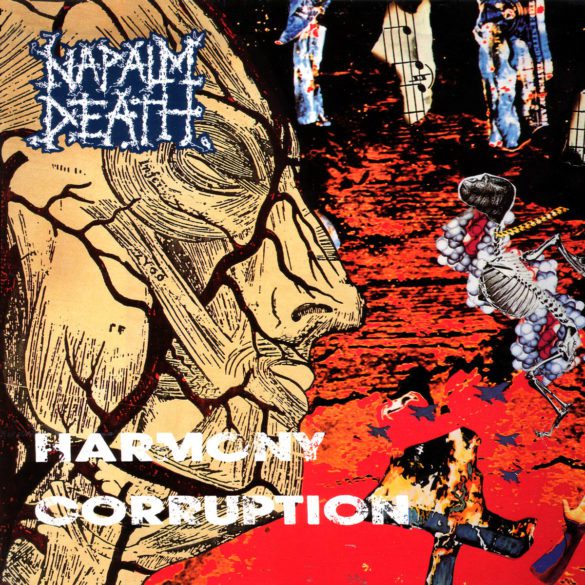
In our Napalm Death special issue, Shane, you ranked Harmony Corruption at #10 in your ranking of Napalm Death albums. The overarching theme of your write-up seemed to be that, with three new members joining the fold since the last album, it was a growing-pains sort of album. Would you agree with that?
Embury: The new guys hadn’t settled in, for sure, and were just going with what Dig [Pearson, Earache Records founder] wanted, and I suppose Mick and I wanted as well. Once we were on, Florida’s reality came in a bit—the seriousness of it all. But saying that, a lot of fun was had. We all are very reactionary and this carried on for a while through the following albums. Growing pains, possibly, but ND is a strange entity.
Harris: I’m sure he has his regrets because it was a highly criticized album, yet critically acclaimed. It’s a sign of the times, no regrets, and no sour apples. We put time and love into that fucking album. It’s no number 10. It’s number one for some and number 36 for others. If you can’t recognize where you’re going after 60 days playing something inside out then you were obviously onto something. I mean, let’s put it into gig perspective. “Suffer the Children” will kill any song in the set as far as crowd reaction. I don’t hear them bitchin’ and complaining then [laughs]. Imagine a set list without “Suffer the Children”; “No, we don’t like that anymore…” C’mon. We pushed the boundaries, we took the risk; it’s never perfect, we make mistakes, we are human, it’s instilled in our souls, our youth, challenges, failures, successes, walls breaking down, countries we never dreamed of playing, it all started there. It won awards; I mean, where do you go from there? Backwards? Who would think that a band like that would appeal to anyone, creating room for growth, food for thought? It was real, passionate, from the fucking heart. We gave up our lives for that shit, so to me, yeah, I’d have done it differently, but every album bothers me. If we can stop being anal about shit and just remember the times, the achievements, the possible impossible, it was all there in the nuts and bolts of everything we put to tape.
To me, Utilitarian was the highlight of my time in our discography. People grapple all day long, Scum vs. FETO; Time Waits vs. Smear Campaign; Fear Emptiness vs. Diatribes. Point is what? Oh, I like the snare better on this, or the guitars on that, or the songs flow better here, or the change of direction, or the experimental years, or the world’s shortest song, or not enough blasts, or I miss the experimental shit, or Lee was better, or Bill was better, Mick or Danny [Herrera], Justin [Broadrick] or Shane, Nick Bullen WAS Napalm. It all plays a part. It’s all noted and taken into our hearts. Critique is as important as it is poisonous.
It’s simple. The sign of the times of what was going on in your personal world at the time… Music meant something to someone. For me, Utilitarian is the most solid fundamental and groundbreaking album we ever did, also because my world was a fucking mess at that time, I put everything I had into that, like more than ever before. I believed, I could see the brightest light while playing, that which stands strong in my heart. Each record played a part in the next steps, and that’s the beauty of music. Perhaps we were ahead of our time, perhaps we were innovators, but people seem to consider certain albums monumental like 10, 15 even 20 years too late [laughs].
What did bringing the new members in to the band change?
Embury: More opinions, obviously, and that created tension, but necessary tension.
Harris: Well, Mick and Shane split the writing for the most part. Mick was there with his two-string guitar and tablature. Mick and I already worked well together on the Defecation Purity Dilution album, so that was a bonus. Shane with his more tricky songs and structures. There was already an album worth of material leaving one song each for me and Jesse to contribute “Mind Snare” (“Territory Under Rule”) and “Inner Incineration.” Neither of those are personal favorites of mine, but it seemed to complement the album. I actually hated “Unfit Earth” but we did lower some notes to make it less cheesy. [John] Tardy and [Glen] Benton made it great, however. Some people love those songs, so it just goes to show that it’s an album, not a few songs; it flows from start to finish.
How many new albums can one listen to from start to finish these days? (Napalm included.) It was short and to the point; we fed off each others’ belief in whatever we were doing, which is what makes a band, not one man’s vision. It’s a collective and I think that outweighed the different members, styles, vocal approaches, whatever. The vocals were done in one take and the album from start to finish in those days. Point is, it was fun as fuck. It was an experience, everything was fresh and new and we were in the hands of the unknown. Somehow, 30 years later, it’s still a conversation piece.
Do you have any other interesting memories from recording the album?
Harris: Oops, I probably [already] mentioned some. It was a rough ride moving to the U.K. at that age with a one-way ticket and $600. Leaving my family, friends; cold and homeless in Nottingham at one point; my god, the loneliness and despair. There’s a lot of awful painful memories, let me tell you. We were cheated into the worst seven-album contract imaginable for pennies.
We were fucked from day one and god knows how we made it this far. Determination and commitment was all we had, but we had each other. There were fun times, new experiences, amazing people we still call friends for life. It’s not all about the music. It’s about the journey. I’ve learned more from my Napalm years than a school, a world, could ever teach. More than any marriage could teach.
Mostly I loved the freedom of being independent; facing the world on your shoulders made it all so much more real, so much more important. Like it mattered more than any education or job could ever matter.
Did you ever think we’d be talking about this album 30 years later?
Embury: No.
Harris: I’m sure we’ll be having this same conversation in 20 years. If we’re still alive, then there is still something to achieve. As bad as it gets, it can always be worse. I try not to think about the future or impact of intense belief in something. I just flow and grow, fail and achieve, try and try again; if it sticks it sticks, if a song haunts me then I hope it’d haunt someone else, in a good way. Sharing, caring, releasing energy is combustion, whichever techniques, approaches; it is art, expressionism, free thought and collective vision.
We don’t see that kind of magic every day. Ride the wave that will ultimately crash until it’s perfected, lay to rest and onto the next challenge. Key ingredient—it has to be fun, there has to be energy or a long road toward an impossible paradox. I like puzzles, where we provide the pieces.
Do you feel the album has a special place in extreme metal history?
Embury: Not for me to say. There’s way better Napalm albums.
Harris: It’s not something that would even cross my mind. It was the first mini steps toward shared common goals. It’s worth mentioning that it stood out amongst thousands of bands and those songs are still played live or in the privacy of cars or homes. Personally, I can’t listen to it. I laid it to rest. Like any album I contribute to, I prefer the live versions of everything. Songs progress over time and become more or less meaningful, more or less of our everyday lives. My only hope is that it helped someone somewhere through difficult times, as it did me.
What does Harmony Corruption mean to you?
Embury: Good times and important times. Memories I reflect on when I am down, and they bring smiles to my face. I met some wonderful people making this album in Florida and a lot of them are my friends today. Not sure if that’s the answer, but right now it feels right.
Harris: I’m perhaps more excited and focused than ever before about the shared energy dispersed over the years between so many like-minded souls. Beneath it all, the album was organic, supported by human nature with the best possible intentions. Looking back, I see nothing else than teamwork. Nothing could have prepared us for what lied ahead of our future selves. Harmony was the first basic steps where there were no limits, no boundaries, just visions that required discipline, respect for others, consideration, caring for history, breaking rules, supporting others, family, humanity, philosophy, philanthropy, sustainability, questioning society, peaceful resolutions… true unity shall not be divided by the lies we are fed. We are so used to bullshit that we forgot what horse shit tastes like. The vision is yours; all conquests are obtainable in time. Start living the life you love and loving the life you live—full stop.





